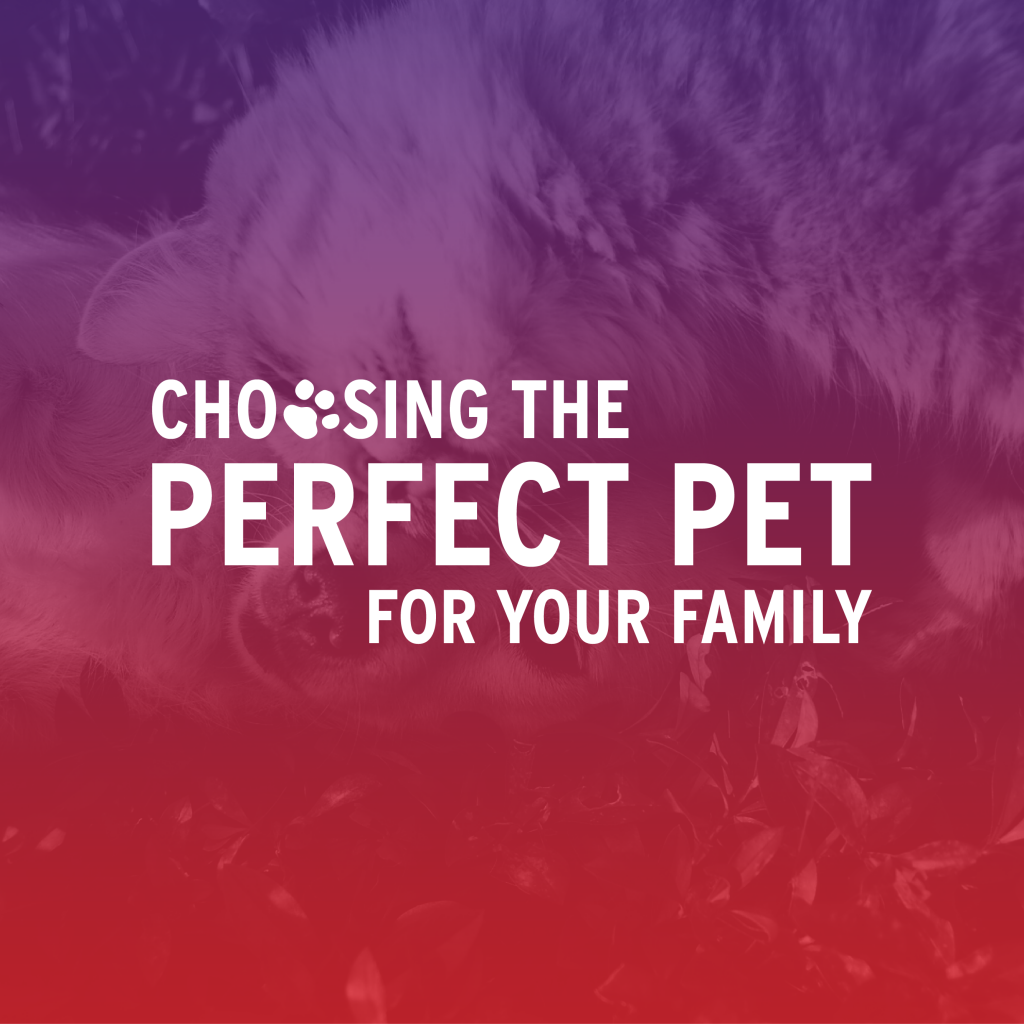Choosing the Perfect Pet for Your Family

Our monthly theme is “We Live in a Zoo,” so it’s fitting to explore what that means. For many of us, animals have a very special place in our hearts. They can also have a special place in your family. A pet can provide companionship and protection, and most of all, unconditional love. Having a pet is also an opportunity to teach your children the value of responsibility and follow-through when there is a furry friend depending on them. But how do you choose the best pet for your family? Here are a few things to consider when making your choice.
Is a pet in the budget? Dogs can cost between $12,000-$20,000.00 over their lifespan. Cats can cost close to $20,000 per pet. But it makes sense when you figure in the cost of the pet, its ongoing veterinary care, neutering, micro-chipping, food, treats, bedding, crates, obedience training, grooming, boarding and other options like fencing and daycare. Of course, the companionship and love they provide greatly enhances your quality of life—but it is a good idea to plan for costs associated with pet ownership.
Are you a neat nick? If you decide you would like to have a pet—keep in mind that animals can be messy. They shed, track in dirt and mud, have “accidents” and they can also cause wear and tear on a home. Dogs and cats should be able to explore their surroundings—containing them is unfair and detrimental to their wellbeing—so keeping them in a secure space, separated from the family is not an option.
How do you feel about pet hair? This question is important enough to merit its own section. Many dogs shed—some excessively—like Huskies, Samoyeds, Labradors, German Shepherds, and Golden Retrievers. The good news for people less tolerant of pet hair is that there are non-shedding varieties of dogs like poodles, terriers, toy breeds and the hybrid Labradoodles and Goldendoodles. Know your tolerance and choose wisely. Keep in mind that non-shedding dogs are also the breeds that require grooming—adding extra cost to the investment.
What is your family’s schedule? Do you have a hectic schedule that keeps you away from home for long periods of time? Keep in mind that dogs are pack animals and require attention and bonding. Too much time alone can be very hard on them. To get around this, some families adopt or purchase more than one dog so they can be there for each other until the family comes home. If it’s in the budget, research doggie daycare for your pet to help you with training and socialization. If you choose a cat, they are much more independent, require less engagement, and can be left alone for longer periods of time.
Gauge the fear factor. Choosing the right temperament for your family dog is important. Big dogs may seem scary—but they are often among the most gentle and sweet. Sometimes the smaller the dog, the more aggressive it can be. I know it’s counterintuitive—but it’s true. Another example? Herding dogs, like Australian Cattle Dogs and Shelties are whip-smart—but they also instinctively nip and bite on occasion–behaviors that might frighten a small child. It all comes down to genetics and training to find the right breed, so do your homework.
What about allergies? Be certain that there are no pet allergies in your family to consider. Cats can be an allergen for many people. Non-shedding dogs are best if you have a dander allergy in the family, making poodles and terriers and “doodles” (Labradoodle and goldendoodle) good choices.
Choose a reputable breeder. If you want a purebred pup, be sure to research your potential breeder and ask for references so you can talk to families who own their puppies. A good breeder creates a bloodline that is filled with positive traits and dependable characteristics, but they will be more expensive because of those features.
Consider adoption. There are wonderful dogs and cats that need homes, so always consider adopting a rescue as your next family member. Fees range from $50-$400 for these animals—but they are often vaccinated and neutered—thus saving those costs. In addition, organizations like the Humane Society will provide you with everything you need to know about the temperament of the dog or cat you are interested in homing. Many rescues also offer free pet parenting lessons and obedience training to make the adoption a success.
Is your family active? Some breeds need a lot of exercise. Working, herding, and hunting dogs require a lot of play time and walking/running because they were bred for activity. These choices need fenced yards as well. Hounds, such as beagles and bassets will also follow their nose and lead you on a chase without leashes and boundaries to rein them in.
In the end, the choice is yours. Hopefully we have given you some food for thought!